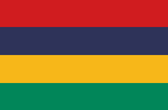
Call 0330 880 3600 Calls may be monitored or recorded. Opening Times.
- TRAVEL INSURANCE
- COVID-19 COVER
- More Options
- Help & Advice
- Existing Customers

Call 0330 880 3600 Calls may be monitored or recorded. Opening Times.

Need help?
UK Customer Services0330 880 3600*
Open Monday to Friday 9:00am to 6pm, Saturday 8:30am to 4pm and closed Sundays.
*Calls are recorded for training and quality purposes.

Official name: Republic of Mauritius
Capital city: Port Louis
Languages spoken: English, French, Mauritian Creole, Bhojpuri, and other Asian languages
Population: Around 1.3 million
Currency: Mauritian rupee (MUR)
Time zone: GMT+4
Driving side: Left
Climate: Tropical, with a warm and humid summer from November to April, and a cooler, drier winter from June to September. Coastal areas are hot and breezy, while the central plateau is fresher.
Mauritius, set in the Indian Ocean east of Madagascar, is renowned for its turquoise lagoons, coral reefs, and volcanic mountains. Its cultural blend of Indian, African, Chinese, and European influences is reflected in festivals, food, and daily life. Often called a luxury destination, the island also offers rich natural parks, tea plantations, and historic sites like Aapravasi Ghat, a UNESCO World Heritage Site.
Mauritius is volcanic in origin, with lush green peaks, a central plateau, and fertile plains. Its coastline is fringed by coral reefs and sandy beaches, while inland attractions include Black River Gorges National Park and Chamarel’s coloured earths. Offshore, smaller islands such as Rodrigues and Île aux Cerfs are popular excursions.
Sir Seewoosagur Ramgoolam International Airport near Mahébourg is the main entry point, with connections to Europe, Africa, and Asia. Public buses are cheap but slow, while taxis and car hire are widely available. Driving is on the left, and road conditions are generally good. Domestic flights and ferries connect Rodrigues Island.
UK nationals do not require a visa for short stays of up to 60 days. A valid passport, proof of accommodation, and onward or return travel are usually requested on entry. The British High Commission is located in Port Louis.
The Mauritian rupee (MUR) is the national currency. ATMs are widely available in towns and at resorts, and major credit cards are accepted. Currency exchange is straightforward at banks and bureaux de change.
Mauritius has a relatively high standard of healthcare compared to many other African nations, with both public and private facilities available. No vaccinations are mandatory for entry, but hepatitis A, typhoid, and tetanus are recommended. Mosquito-borne illnesses such as dengue and chikungunya occur, so repellent is advisable. Tap water quality varies, so bottled water is safest. Comprehensive travel insurance is recommended.